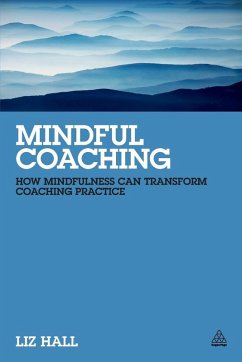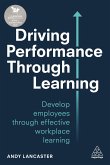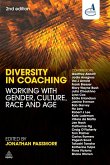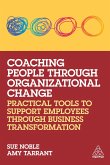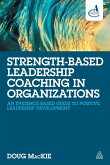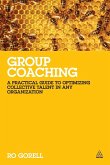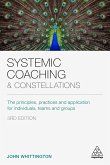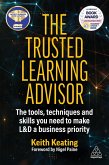- Broschiertes Buch
- Merkliste
- Auf die Merkliste
- Bewerten Bewerten
- Teilen
- Produkt teilen
- Produkterinnerung
- Produkterinnerung
Use mindfulness in coaching to solve issues including stress management, employee engagement and work-life balance with this complete guide.
Andere Kunden interessierten sich auch für
![Driving Performance through Learning Driving Performance through Learning]() Andy LancasterDriving Performance through Learning24,99 €
Andy LancasterDriving Performance through Learning24,99 €![Diversity in Coaching Diversity in Coaching]() Jonathan PassmoreDiversity in Coaching42,99 €
Jonathan PassmoreDiversity in Coaching42,99 €![Coaching People Through Organizational Change: Practical Tools to Support Employees Through Business Transformation Coaching People Through Organizational Change: Practical Tools to Support Employees Through Business Transformation]() Sue NobleCoaching People Through Organizational Change: Practical Tools to Support Employees Through Business Transformation41,99 €
Sue NobleCoaching People Through Organizational Change: Practical Tools to Support Employees Through Business Transformation41,99 €![Strength-Based Leadership Coaching in Organizations Strength-Based Leadership Coaching in Organizations]() Doug MacKieStrength-Based Leadership Coaching in Organizations42,99 €
Doug MacKieStrength-Based Leadership Coaching in Organizations42,99 €![Group Coaching Group Coaching]() Ro GorellGroup Coaching42,99 €
Ro GorellGroup Coaching42,99 €![Systemic Coaching and Constellations Systemic Coaching and Constellations]() John Whittington (Coach, facilitator, author)Systemic Coaching and Constellations31,99 €
John Whittington (Coach, facilitator, author)Systemic Coaching and Constellations31,99 €![The Trusted Learning Advisor The Trusted Learning Advisor]() Keith KeatingThe Trusted Learning Advisor27,99 €
Keith KeatingThe Trusted Learning Advisor27,99 €-
-
-
Use mindfulness in coaching to solve issues including stress management, employee engagement and work-life balance with this complete guide.
Hinweis: Dieser Artikel kann nur an eine deutsche Lieferadresse ausgeliefert werden.
Hinweis: Dieser Artikel kann nur an eine deutsche Lieferadresse ausgeliefert werden.
Produktdetails
- Produktdetails
- Verlag: Kogan Page Ltd
- Seitenzahl: 282
- Erscheinungstermin: 1. April 2013
- Englisch
- Abmessung: 234mm x 156mm x 16mm
- Gewicht: 464g
- ISBN-13: 9780749465667
- ISBN-10: 0749465662
- Artikelnr.: 36721478
- Herstellerkennzeichnung
- Libri GmbH
- Europaallee 1
- 36244 Bad Hersfeld
- gpsr@libri.de
- Verlag: Kogan Page Ltd
- Seitenzahl: 282
- Erscheinungstermin: 1. April 2013
- Englisch
- Abmessung: 234mm x 156mm x 16mm
- Gewicht: 464g
- ISBN-13: 9780749465667
- ISBN-10: 0749465662
- Artikelnr.: 36721478
- Herstellerkennzeichnung
- Libri GmbH
- Europaallee 1
- 36244 Bad Hersfeld
- gpsr@libri.de
Liz Hall is an award-winning journalist and coach. Awards include the Periodical Training Association¿s Journalist of the Year award and the Association for Coaching¿s Award for Impacting (Leadership/External Focus) Service to the Wider Community for 2010-11. She is the editor and co-owner of Coaching at Work magazine, has written and worked for publications including The Guardian; The Financial Times; The Observer and The Daily Mail. She has written publications including The Employers¿ Guide to Screening Employees and The Employer¿s Guide to Monitoring Employees.
Acknowledgements
Foreword by Peter Hawkins
What you will find in this book
Introduction
Part 1: Overview
01 Definitions, origins and relevance to coaching
Defining mindfulness
Present moment, happy moment
A brief orientation to coaching
02 A brief history of mindfulness
Not just Buddhist
03 The impact of mindfulness
We can change our spots and learn new tricks
Benefits of mindfulness
Part 2: Fundamental principles
04 Presence
Definitions
Setting up a practice
05 Curiosity, enquiry and non-judgement
Curiosity
Enquiry
Non-judgement
06 Attunement and resonance
Mirror, mirror
Defining attunement
Resonance
07 Compassion
Compassion in coaching
Developing compassion through mindfulness
Benefits
Better outcomes
08 Being and doing
Doing versus being?
Letting go
Emotion regulation systems
Own goals?
Acceptance
Back to the future
Pressing pause
Part 3: Working with mindfulness in coaching and mentoring
09 Developing, supporting and nurturing the coach
Session preparation
Within the coaching session
After the coaching session
10 Introducing mindfulness to clients
Appropriateness
Overcoming resistance
Making the business case for mindfulness
Running mindfulness programmes
11 The FEEL model
FEEL: a model for applying mindfulness
The model
Client issues
12 Stress, anxiety, depression and work-life balance
The good guy and the bad guy
How stress affects us
Approach and avoidance orientation
Discrepancy-based processing
How mindfulness can help
Remedial coaching
The great god of busyness
13 Resilience, happiness and wellbeing
Definitions
What makes us resilient?
How mindfulness can help
Health and wellbeing
14 Uncertainty, change, complexity and interconnectedness
Uncertainty
Change and impermanence
Complexity
Systems and interconnectedness
15 Working with leaders
What makes a leader resonant?
Dissonance and burnout
More mindful leaders
Mindfulness within leadership models
Emotional intelligence
16 Ethics
Accountability
Mindfulness and ethics
Leadership characteristics
Challenging
Desire
Tips on using mindfulness to promote ethics
17 Working with emotions
Self-awareness
Self-management
Social awareness and relationship management
Self-esteem, self-compassion and self-acceptance
Growth in self-criticism
Not easy
Recommended mindfulness practices
18 Creativity
Getting out of our own way
'Mistakes' and mindfulness
Mindful music
Helping our clients be more creative
Creative thinking
Using mindfulness with the client
Tips for using mindfulness for creativity in clients
Recommended mindfulness practices
19 Mindfulness and other approaches
Mindfulness in movement
Gestalt
Integration
Somatics
Ontological coaching
Transactional analysis
Transpersonal coaching and psychosynthesis
Cognitive behavioural coaching
Acceptance and commitment therapy
Thinking environment
Inner Game
Part 4: The future
20 The Mindfulness in Coaching survey
Coaches' experience of mindfulness
Direct benefits for coaches
General comments
About the survey
21 The future is mindful
Trends
Conclusion
References
Further reading
Index
Foreword by Peter Hawkins
What you will find in this book
Introduction
Part 1: Overview
01 Definitions, origins and relevance to coaching
Defining mindfulness
Present moment, happy moment
A brief orientation to coaching
02 A brief history of mindfulness
Not just Buddhist
03 The impact of mindfulness
We can change our spots and learn new tricks
Benefits of mindfulness
Part 2: Fundamental principles
04 Presence
Definitions
Setting up a practice
05 Curiosity, enquiry and non-judgement
Curiosity
Enquiry
Non-judgement
06 Attunement and resonance
Mirror, mirror
Defining attunement
Resonance
07 Compassion
Compassion in coaching
Developing compassion through mindfulness
Benefits
Better outcomes
08 Being and doing
Doing versus being?
Letting go
Emotion regulation systems
Own goals?
Acceptance
Back to the future
Pressing pause
Part 3: Working with mindfulness in coaching and mentoring
09 Developing, supporting and nurturing the coach
Session preparation
Within the coaching session
After the coaching session
10 Introducing mindfulness to clients
Appropriateness
Overcoming resistance
Making the business case for mindfulness
Running mindfulness programmes
11 The FEEL model
FEEL: a model for applying mindfulness
The model
Client issues
12 Stress, anxiety, depression and work-life balance
The good guy and the bad guy
How stress affects us
Approach and avoidance orientation
Discrepancy-based processing
How mindfulness can help
Remedial coaching
The great god of busyness
13 Resilience, happiness and wellbeing
Definitions
What makes us resilient?
How mindfulness can help
Health and wellbeing
14 Uncertainty, change, complexity and interconnectedness
Uncertainty
Change and impermanence
Complexity
Systems and interconnectedness
15 Working with leaders
What makes a leader resonant?
Dissonance and burnout
More mindful leaders
Mindfulness within leadership models
Emotional intelligence
16 Ethics
Accountability
Mindfulness and ethics
Leadership characteristics
Challenging
Desire
Tips on using mindfulness to promote ethics
17 Working with emotions
Self-awareness
Self-management
Social awareness and relationship management
Self-esteem, self-compassion and self-acceptance
Growth in self-criticism
Not easy
Recommended mindfulness practices
18 Creativity
Getting out of our own way
'Mistakes' and mindfulness
Mindful music
Helping our clients be more creative
Creative thinking
Using mindfulness with the client
Tips for using mindfulness for creativity in clients
Recommended mindfulness practices
19 Mindfulness and other approaches
Mindfulness in movement
Gestalt
Integration
Somatics
Ontological coaching
Transactional analysis
Transpersonal coaching and psychosynthesis
Cognitive behavioural coaching
Acceptance and commitment therapy
Thinking environment
Inner Game
Part 4: The future
20 The Mindfulness in Coaching survey
Coaches' experience of mindfulness
Direct benefits for coaches
General comments
About the survey
21 The future is mindful
Trends
Conclusion
References
Further reading
Index
Acknowledgements
Foreword by Peter Hawkins
What you will find in this book
Introduction
Part 1: Overview
01 Definitions, origins and relevance to coaching
Defining mindfulness
Present moment, happy moment
A brief orientation to coaching
02 A brief history of mindfulness
Not just Buddhist
03 The impact of mindfulness
We can change our spots and learn new tricks
Benefits of mindfulness
Part 2: Fundamental principles
04 Presence
Definitions
Setting up a practice
05 Curiosity, enquiry and non-judgement
Curiosity
Enquiry
Non-judgement
06 Attunement and resonance
Mirror, mirror
Defining attunement
Resonance
07 Compassion
Compassion in coaching
Developing compassion through mindfulness
Benefits
Better outcomes
08 Being and doing
Doing versus being?
Letting go
Emotion regulation systems
Own goals?
Acceptance
Back to the future
Pressing pause
Part 3: Working with mindfulness in coaching and mentoring
09 Developing, supporting and nurturing the coach
Session preparation
Within the coaching session
After the coaching session
10 Introducing mindfulness to clients
Appropriateness
Overcoming resistance
Making the business case for mindfulness
Running mindfulness programmes
11 The FEEL model
FEEL: a model for applying mindfulness
The model
Client issues
12 Stress, anxiety, depression and work-life balance
The good guy and the bad guy
How stress affects us
Approach and avoidance orientation
Discrepancy-based processing
How mindfulness can help
Remedial coaching
The great god of busyness
13 Resilience, happiness and wellbeing
Definitions
What makes us resilient?
How mindfulness can help
Health and wellbeing
14 Uncertainty, change, complexity and interconnectedness
Uncertainty
Change and impermanence
Complexity
Systems and interconnectedness
15 Working with leaders
What makes a leader resonant?
Dissonance and burnout
More mindful leaders
Mindfulness within leadership models
Emotional intelligence
16 Ethics
Accountability
Mindfulness and ethics
Leadership characteristics
Challenging
Desire
Tips on using mindfulness to promote ethics
17 Working with emotions
Self-awareness
Self-management
Social awareness and relationship management
Self-esteem, self-compassion and self-acceptance
Growth in self-criticism
Not easy
Recommended mindfulness practices
18 Creativity
Getting out of our own way
'Mistakes' and mindfulness
Mindful music
Helping our clients be more creative
Creative thinking
Using mindfulness with the client
Tips for using mindfulness for creativity in clients
Recommended mindfulness practices
19 Mindfulness and other approaches
Mindfulness in movement
Gestalt
Integration
Somatics
Ontological coaching
Transactional analysis
Transpersonal coaching and psychosynthesis
Cognitive behavioural coaching
Acceptance and commitment therapy
Thinking environment
Inner Game
Part 4: The future
20 The Mindfulness in Coaching survey
Coaches' experience of mindfulness
Direct benefits for coaches
General comments
About the survey
21 The future is mindful
Trends
Conclusion
References
Further reading
Index
Foreword by Peter Hawkins
What you will find in this book
Introduction
Part 1: Overview
01 Definitions, origins and relevance to coaching
Defining mindfulness
Present moment, happy moment
A brief orientation to coaching
02 A brief history of mindfulness
Not just Buddhist
03 The impact of mindfulness
We can change our spots and learn new tricks
Benefits of mindfulness
Part 2: Fundamental principles
04 Presence
Definitions
Setting up a practice
05 Curiosity, enquiry and non-judgement
Curiosity
Enquiry
Non-judgement
06 Attunement and resonance
Mirror, mirror
Defining attunement
Resonance
07 Compassion
Compassion in coaching
Developing compassion through mindfulness
Benefits
Better outcomes
08 Being and doing
Doing versus being?
Letting go
Emotion regulation systems
Own goals?
Acceptance
Back to the future
Pressing pause
Part 3: Working with mindfulness in coaching and mentoring
09 Developing, supporting and nurturing the coach
Session preparation
Within the coaching session
After the coaching session
10 Introducing mindfulness to clients
Appropriateness
Overcoming resistance
Making the business case for mindfulness
Running mindfulness programmes
11 The FEEL model
FEEL: a model for applying mindfulness
The model
Client issues
12 Stress, anxiety, depression and work-life balance
The good guy and the bad guy
How stress affects us
Approach and avoidance orientation
Discrepancy-based processing
How mindfulness can help
Remedial coaching
The great god of busyness
13 Resilience, happiness and wellbeing
Definitions
What makes us resilient?
How mindfulness can help
Health and wellbeing
14 Uncertainty, change, complexity and interconnectedness
Uncertainty
Change and impermanence
Complexity
Systems and interconnectedness
15 Working with leaders
What makes a leader resonant?
Dissonance and burnout
More mindful leaders
Mindfulness within leadership models
Emotional intelligence
16 Ethics
Accountability
Mindfulness and ethics
Leadership characteristics
Challenging
Desire
Tips on using mindfulness to promote ethics
17 Working with emotions
Self-awareness
Self-management
Social awareness and relationship management
Self-esteem, self-compassion and self-acceptance
Growth in self-criticism
Not easy
Recommended mindfulness practices
18 Creativity
Getting out of our own way
'Mistakes' and mindfulness
Mindful music
Helping our clients be more creative
Creative thinking
Using mindfulness with the client
Tips for using mindfulness for creativity in clients
Recommended mindfulness practices
19 Mindfulness and other approaches
Mindfulness in movement
Gestalt
Integration
Somatics
Ontological coaching
Transactional analysis
Transpersonal coaching and psychosynthesis
Cognitive behavioural coaching
Acceptance and commitment therapy
Thinking environment
Inner Game
Part 4: The future
20 The Mindfulness in Coaching survey
Coaches' experience of mindfulness
Direct benefits for coaches
General comments
About the survey
21 The future is mindful
Trends
Conclusion
References
Further reading
Index

